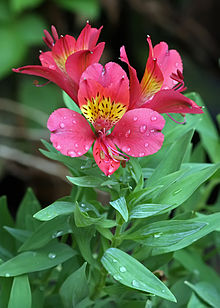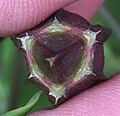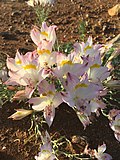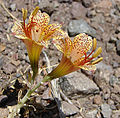| Alstroemeria | |
|---|---|

| |
| Peruvian lily (Alstroemeria aurea) | |
| Scientific classification | |
| Kingdom: | Plantae |
| Clade: | Tracheophytes |
| Clade: | Angiosperms |
| Clade: | Monocots |
| Order: | Liliales |
| Family: | Alstroemeriaceae |
| Tribe: | Alstroemerieae |
| Genus: | Alstroemeria L. |
| Type species | |
| Alstroemeria pelegrina L. | |
| Synonyms | |
| |


Alstroemeria (/ˌælstrɪˈmɪəriə/), commonly called the Peruvian lily or lily of the Incas, is a genus of flowering plants in the family Alstroemeriaceae. They are all native to South America, although some have become naturalized in the United States, Mexico, Australia, New Zealand, Madeira and the Canary Islands. Almost all of the species are restricted to one of two distinct centers of diversity: one in central Chile and southern Argentina, the other in eastern Brazil. Species of Alstroemeria from Patagonia are winter-growing plants, while those of Brazil are summer growing. All are long-lived perennials except A. graminea, a diminutive annual from the Atacama Desert of Chile.
Description
Plants of this genus grow from a cluster of tubers. They send up fertile and sterile stems, the fertile stems of some species reaching 1.5 meters (4.9 feet) in height. The leaves are alternately arranged and resupinate, twisted on the petioles so that the undersides face up. The leaves are variable in shape and the blades have smooth edges. The flowers are solitary or borne in umbels. The flower has six petals each up to 5 centimeters (2.0 inches) long. They come in many shades of red, orange, yellow, green, purple, pink, and white, flecked and striped and streaked with darker colors. There are six curving stamens. The stigma has three lobes. The fruit is a capsule with three valves. Alstroemeria are classified as an inferior monocot, meaning the petals are located above the ovary and the leaf veins are parallel.
-
 An Alstroemeria cultivar
An Alstroemeria cultivar
-
 Alstroemeria capsule viewed from above, showing anatomical detail, including apical beak, vascular bundles (in section) in ribs etc.
Alstroemeria capsule viewed from above, showing anatomical detail, including apical beak, vascular bundles (in section) in ribs etc.
-
 Alstroemeria seed capsule viewed from side, showing winged ribs and (triangular pyramidal) apical beak.
Alstroemeria seed capsule viewed from side, showing winged ribs and (triangular pyramidal) apical beak.
-
 Premature dehiscence of Alstroemeria seed capsule
Premature dehiscence of Alstroemeria seed capsule
Distribution and habitat
The genus Alstroemeria is exclusively native to South America, with various species found ranging from Venezuela (3° north of the Equator), to Tierra del Fuego, Argentina (53° South). Within this range of the entire genus, two centers of species diversity are recognized, one in Brazil and one in Chile.
In Chile, Alstroemeria is amongst the most diverse genera of vascular monocotyledons, with more than 50 recognized or accepted taxa (species, subspecies and varieties). Of these taxa, roughly 80% are endemic to the Mediterranean matorral zone of central Chile.
In Brazil, which is home to more than 40 species, most Alstroemeria species are found outside of the Amazonian region, and are concentrated towards the south and east of the country. Alstroemeria can be found in almost all types of habitat, from forests to savannahs, caatingas to swamps, and commonly, high altitude grasslands and rocky outcrops, with typical altitudes ranging from 300m in the Amazon, to 2300m in the Itatiaia National Park. Most Brazilian species have relatively restricted distributions.
Taxonomy
The genus was described by Johan Peter Falk and his thesis supervisor Carl Linnaeus in his 1762 dissertation Planta Alströmeria. Linnaeus bears the botanical authority (L.).
Etymology
The genus was named after the Swedish baron Clas Alströmer (1736–1794), a friend of Linnaeus.
Cultivation and uses
Many hybrids and at least 190 cultivars have been developed, featuring many markings and colors, including white, yellow, orange, apricot, pink, red, purple, and lavender. The most popular and showy hybrids commonly grown today result from crosses between species from Chile (winter-growing) with species from Brazil (summer-growing). This strategy has overcome the florists' problem of seasonal dormancy and resulted in plants that are evergreen, or nearly so, and flower for most of the year. This breeding work derives mainly from trials that began in the United States in the 1980s; the main breeding is done nowadays by companies in the Netherlands. The flower, which resembles a miniature lily, is very popular for bouquets and flower arrangements in the commercial cut flower trade. These delicate flowers survive up to 14 days in water without any signs of shrivelling.
Most cultivars available for the home garden will bloom in the late spring and early summer. The roots are hardy to a temperature of 23 °F (−5 °C). The plant requires at least six hours of morning sunlight, regular water, and well-drained soil.
AGM cultivars
The following cultivars have gained the Royal Horticultural Society's Award of Garden Merit, all with a hardiness rating of H4 (Hardy – average winter −10 to −5 °C (14 to 23 °F)) apart from 'Friendship' (H5: Hardy – cold winter −15 to −10 °C (5 to 14 °F)):
- 'Apollo' (white/yellow flowers, 100 cm)
- 'Cahors' (pink/yellow, 90 cm)
- 'Coronet' (salmon/yellow flowers, 140 cm)
- 'Friendship' (yellow flushed pink, 100 cm)
- 'Orange Glory' (150 cm)
- 'Oriana' (salmon/yellow, 50 cm)
- 'Phoenix' (red/yellow, 100 cm)
- 'Red Elf' (100 cm)
- 'Sirius' (pink/yellow, 100 cm)
- 'Sonata' (red/yellow, 100 cm)
- 'Spitfire' (orange/yellow, 90 cm)
- 'Tessa' (red flowers, 120 cm)
- 'Yellow Friendship' (140 cm)
Ecology
Some alstroemerias have escaped cultivation and become weeds, such as Alstroemeria pulchella. and A. aurea, which are now weeds in Australia.
Species
Main article: List of Alstroemeria speciesSee also
Citations
- Alstroemeria | International Plant Names Index. (n.d.). Retrieved August 12, 2023, from https://www.ipni.org/n/326331-2
- Kew World Checklist of Selected Plant Families
- Alstroemeria. Flora of North America.
- Sanso, A.M.; Camargo de Assis, M.; Xifreda, C.C. (June 2005). "ALSTROEMERIA: A CHARMING GENUS". Acta Horticulturae (683): 63–78. doi:10.17660/actahortic.2005.683.5. ISSN 0567-7572.
- ^ Finot, Victor L.; Baeza, Carlos M.; Ruiz, Eduardo; Toro, Oscar; Carrasco, Pedro (2017-12-20), "Towards an Integrative Taxonomy of the Genus Alstroemeria (Alstroemeriaceae) in Chile: A Comprehensive Review", Selected Studies in Biodiversity, IntechOpen, ISBN 978-1-78923-233-2, retrieved 2025-01-16
- Assis, Marta Camargo de (December 2012). "Alstroemeriaceae na Região Sul do Brasil". Rodriguésia (in Portuguese). 63: 1117–1132. doi:10.1590/S2175-78602012000400022. ISSN 0370-6583.
- Linnaeus & Falk 1762.
- Long Lasting Flowers
- "RHS Plant Selector Alstroemeria 'Apollo' AGM / RHS Gardening". Apps.rhs.org.uk. Retrieved 5 April 2020.
- "Alstroemeria 'Cahors'". Royal Horticultural Society. Retrieved 5 January 2018.
- "RHS Plant Selector Alstroemeria 'Coronet' AGM / RHS Gardening". Apps.rhs.org.uk. Retrieved 5 April 2020.
- "RHS Plant Selector Alstroemeria 'Friendship' AGM / RHS Gardening". Apps.rhs.org.uk. Retrieved 2013-04-30.
- "RHS Plant Selector Alstroemeria 'Orange Glory' AGM / RHS Gardening". Apps.rhs.org.uk. Retrieved 5 April 2020.
- "Alstroemeria 'Oriana'". Royal Horticultural Society. Retrieved 5 January 2018.
- "Alstroemeria 'Phoenix'". Royal Horticultural Society. Retrieved 5 January 2018.
- "Alstroemeria 'Red Elf'". Royal Horticultural Society. Retrieved 5 January 2018.
- "Alstroemeria 'Sirius'". Royal Horticultural Society. Retrieved 5 January 2018.
- "Alstroemeria 'Sonata'". Royal Horticultural Society. Retrieved 5 January 2018.
- "Alstroemeria 'Spitfire'". Royal Horticultural Society. Retrieved 5 January 2018.
- "Alstroemeria 'Tessa'". Royal Horticultural Society. Retrieved 5 January 2018.
- "RHS Plant Selector Alstroemeria 'Yellow Friendship' AGM / RHS Gardening". Apps.rhs.org.uk. Retrieved 5 April 2020.
- Rojas, Gloria; Baeza, Carlos M. (2021). "Alstroemeria esteparica (Alstroemeriaceae) una nueva especie para la flora del Cono Sur de Sudamérica" [Alstroemeria esteparica (Alstroemeriaceae) a new species to Southern Cone of South America]. Gayana. Botánica (in Spanish). 78 (1): 77–85. doi:10.4067/S0717-66432021000100077.
General sources
- Linnaeus; Falk, Johan Peter (1762). Planta Alströmeria. Holmiae: Laurentii Salvii., published in Amoenitates Academicae 6: 247–262 1763
- Sanso, Andrea Mariel (1996). "El Género Alstroemeria (Alstroemeriaceae) en Argentina". Darwiniana. 34 (1/4): 349–382. JSTOR 23223205.




















